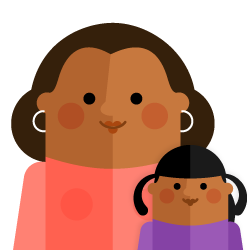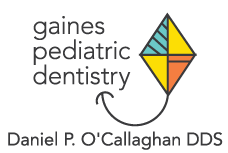 0-2 Years Old
0-2 Years Old
Your baby’s teeth will typically start to erupt when he or she is around 6-8 months. Girl’s teeth often erupt slightly earlier than boy’s teeth. Once their teeth start to erupt, start brushing them with a soft baby toothbrush twice a day. Most children will benefit from the use of fluoridated toothpaste. In fact, both the American Dental Association and American Academy of Pediatric Dentistry affirm that applying a small smear of fluoride containing toothpaste will strengthen and clean the teeth. If you use a fluoridated toothpaste make sure you use a very small amount (about the size of a piece of rice) so that even if swallowed, it will be safe for your baby. During your office visit, Dr. O’Callaghan will assess the cavity risk for your child and will provide an individual recommendation for professional fluoride applications and/or fluoride use at home.
As you begin to introduce foods to your child keep in mind that high cavity risk dietary habits have been shown to be established by 12 months of age and continue throughout childhood. Also, when it comes to your child’s diet, make sure they don’t go to sleep with a bottle or sippy cup because the natural sugar from milk, formula, juice, and even breast milk, if left on the teeth for extended periods of time, can cause tooth decay. You should bring your child in to see Dr. O’Callaghan as soon as their first tooth erupts and no later than their first birthday. We will happily go over everything in detail with you!
First time to the dentist?
 3-5 Years Old
3-5 Years Old
By the age of 3, your child should have all 20 of their baby teeth. Did you know 40% of kids get cavities before kindergarten? Gaines Pediatric Dentistry is committed to working with you to prevent cavities in your preschool children. You can help prevent cavities by ensuring they stop using a bottle or sippy cup by the age of 1 and by using a fluoride toothpaste to brush with. You should also make sure they don’t eat too many in-between meal snacks, especially sticky foods like fruit snacks and candy. To prevent problems with their bite and facial development, make sure your child stops any sucking habits (pacifier, thumb sucking, etc.) by the age of 3 if possible. Preschool children are gaining independence at home especially after conquering toilet training. Nevertheless, we recommend parental assistance with brushing. You can make sure to teach them proper brushing techniques to clean all of the surfaces of their teeth. It’s a good idea to brush after they do to ensure proper oral hygiene. Your child will get better at teeth brushing with age, and if taught well, you will instill a lifetime of positive, healthy habits!
It’s Never too Late for Your Child’s First Dental Visit
 6-11 Years Old
6-11 Years Old
At this age your child will start to lose their first teeth and the tooth fairy will be visiting your house frequently! Around age 6, your child will begin to lose his or her baby teeth and gain permanent ones. Once their teeth start to touch (it could be sooner) you should begin to floss them to ensure proper cleaning. Children have trouble reaching the back teeth and tend to ignore the gum line, so pay extra care to these areas. In addition to losing teeth, your child will get four new permanent molars behind their baby molars. These molars take the space that has been created by the last three years of jaw growth. These permanent molars are at greatest risk for cavities in the first few months after eruption so regular dental visits and supervised brushing are important. We offer dental sealants, which are a safe and effective way to protect the permanent molars. Dental sealants are a thin layer of restorative material that is placed over the deep grooves of the teeth and prevents cavities. Your child will also start to become active with sports and athletics, becoming more prone to dental injuries, so make sure you talk with Dr. O’Callaghan about mouthguards.
We’ll build a foundation for a lifetime of smiles!
 12-18 Years Old
12-18 Years Old
Your child should have lost all of their baby teeth around the age of 13, leaving them with a full set of permanent teeth. Not including wisdom teeth, there are 28 permanent teeth. Teenage years are a time of increasing independence and self-awareness, and with their newfound freedom, teenagers can make poor diet choices such as sports drinks, pop, and candy. Cavities are most common in teens because of a lack of cleaning and a bad diet. At this stage your child may also become more concerned about the “look” of their smile. Our office will recommend a panoramic X-ray of your child’s jaws to check the development of their third molars, making sure everything looks healthy! Please let us know if your child is experiencing any tooth pain, and we’ll be sure to take care of it!
